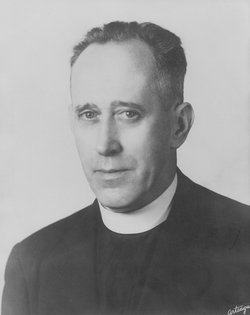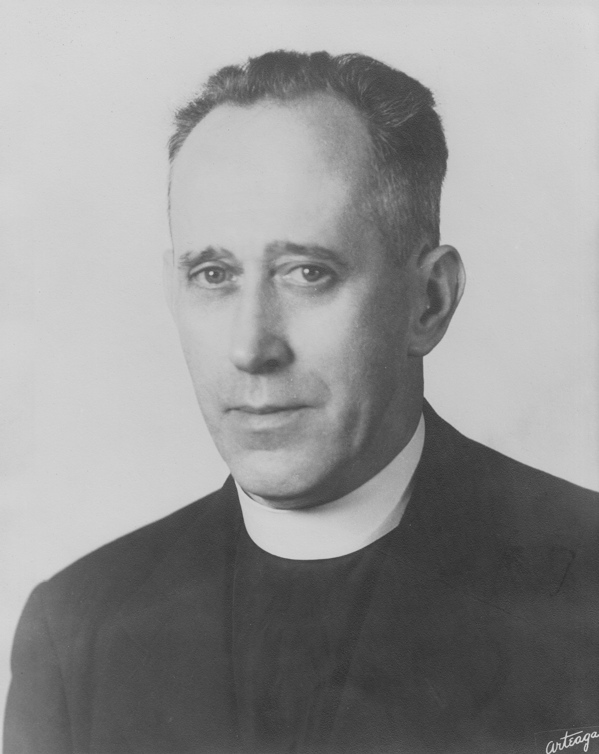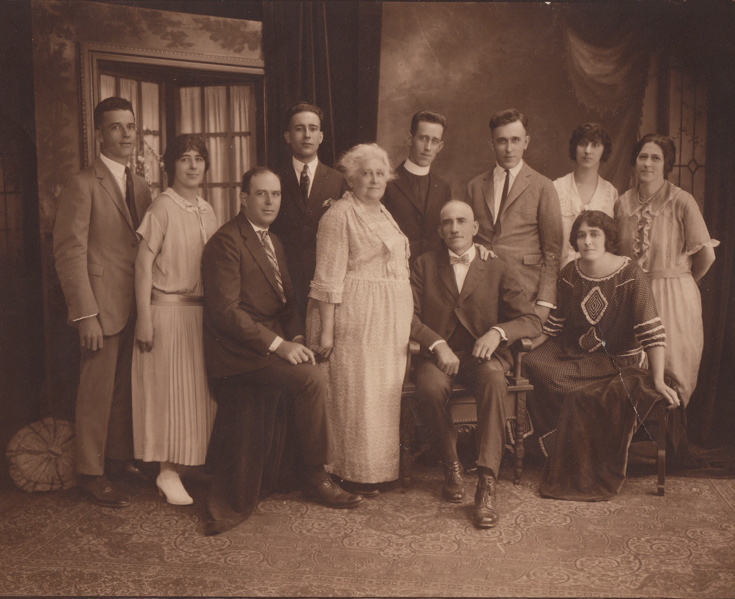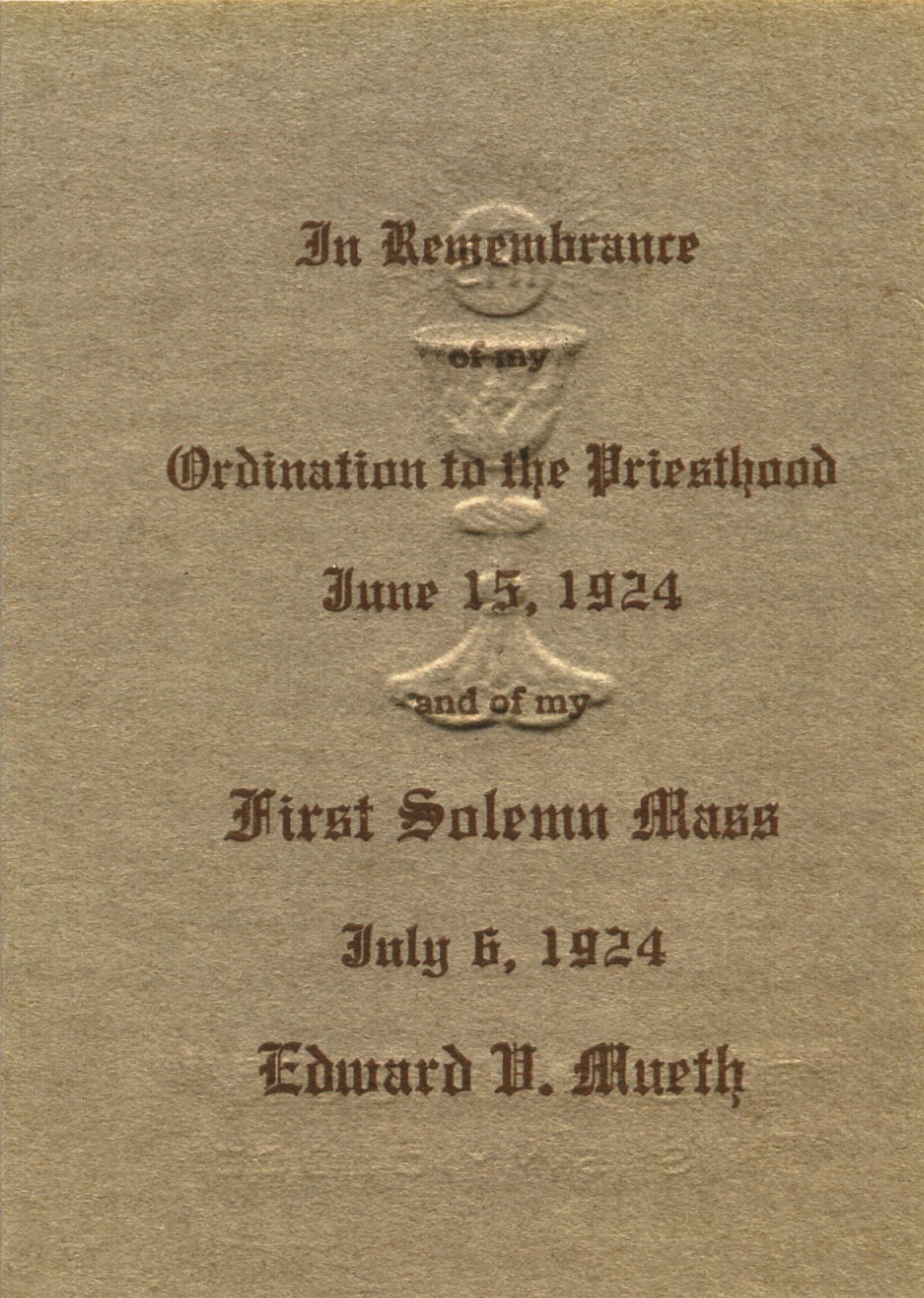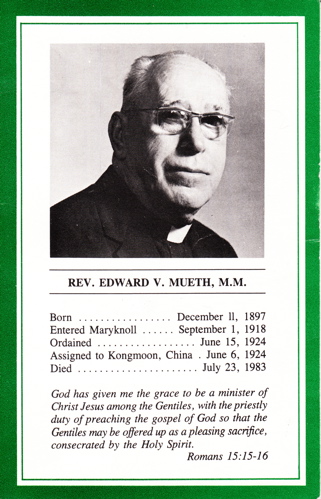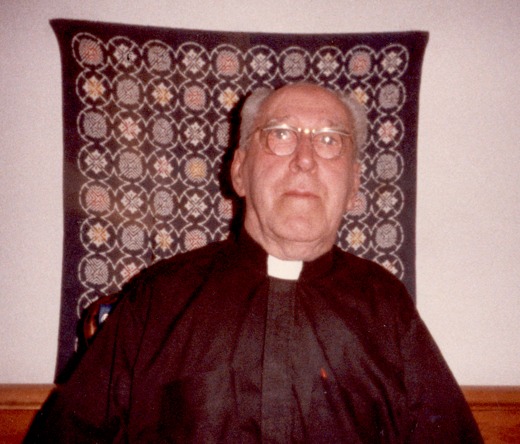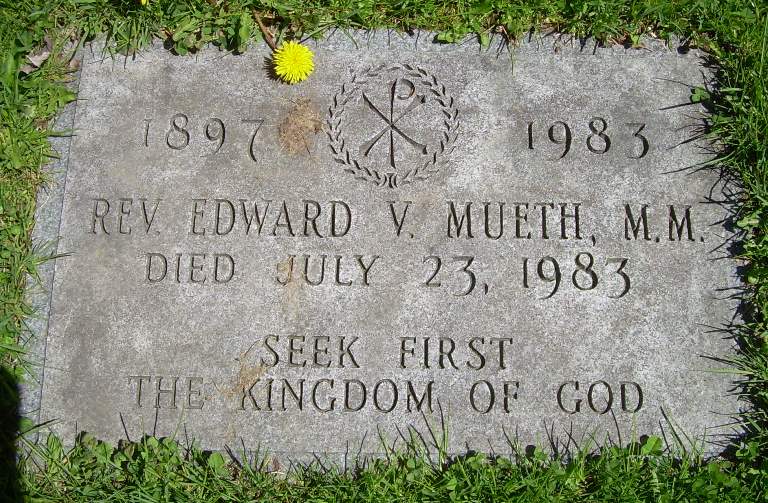Father Mueth was born in St. Louis and attended the former St. Henry Catholic School in South St. Louis and the St. Louis Preparatory Seminary. He entered the Maryknoll Seminary in 1918 and was ordained to the priesthood on 6/15/1925. His first assignment was to Kongmoon, China, where he served for 26 years. In 1950, he was assigned to Hong Kong where he stayed for 7 years. In 1957 he was assigned to Hawaii and remained there until 1964.
________________________
An account of the experiences of Edward V. Mueth while in China:
He was ordained on June 15, 1924 at the Maryknoll Seminary in Ossining, N. Y. and was assigned to the mission field in Southern China. After his first solemn high mass in St. Henry's Church in St. Louis and a few weeks vacation, he returned to NY to begin preparation for his foreign travels.
He sailed from Seattle, Wash. The middle of October, 1924. As I recall, the trip took 21 days and he was confined to his berth most of the time [seasick]. The ship—President Lines—stopped at Shanghai and then Hong Kong. From there he went to Kuomintang (?) Province in southern China to a small village (Yeounkong ?) where the house had no electricity nor indoor plumbing. He hired a young Chinese boy as a cook who he taught our western cooking, and also a house boy.
When he went out on a mission trip, he hired a chair along with two coolies to carry the chair along with two or three to carry baggage. These trips took about ten days. One time he arrived in a village where he had to stay in one of their temples. Some of these folks had never seen a white man so he was a curiosity and brought a lot of Chinese to see him.
Shortly after he arrived in China, the magistrate of the village went through the village and inquired who lived in a certain house and, when he learned that a foreigner lived there, he said the "foreigner devil" would be compelled to move out. His Chinese friends attended these meetings as to forcing him out and would report the result of these meetings. So, they had to sneak his valuables away. They put these in straw baskets covered with uncut potato leaves. On the day of the arranged eviction, Ed and Father Joe McGuin walked the floor smoking one cigarette after another, but no eviction took place. It was a terrible experience.
At one time he was captured by bandits and was in captivity about a week. Another hair-raising experience he said the bandit was demanding money and held a knife over his head ready to drop it into his skull at any time.
After eight years, he came back to the States (1932) for a furlough. He came across the water on a freighter—he liked the freighter—and arrived in California. He did not get in touch with the family for more than a week, and when Dad and Henry went to the depot to pick him up, he did not know Henry [his brother]. He knew Dad. And at 1920 [home], one day he said "Who is that woman in the kitchen?" It was his sister Mary. For months and months, he felt everyone looked at him thinking he was different.
After two years in the States, he went back to China—again on a freighter. This time he did not get seasick. He again went to Southern China—a different village—and resumed his mission work.
After the Japanese attacked Pearl Harbor—Dec. 7, 1941—he had to flee from China. He used to flee by foot at day and slept in the tall grasses at night. For fourteen months he was on the go. One time he and Bishop Paschang (a native of Martinsburg, MV) were on the move and stopped at a house of a Chinese. When they heard the Japanese were coming near, they went for shelter. There was a hayloft so they took to that. Bishop Paschang was a short man so he needed a boost from Ed. Before Ed tried it, he looked around to see that there was no sign of anyone else around. He saw six rice bowls on the table, so immediately put two in the cupboard. There was an old couple and two Chinese nuns—four bowls. These four were taken prisoner and the good Lord saved the priest and bishop in the hayloft—a narrow escape.
Ed continued his escape from China and would sometimes meet U.S. airmen who would give him a lift. He did get to an army camp and did work as a chaplain. They gave him khaki clothes but he wore black shoes. In his flight from China, he met a Maryknoll priest—Father Robert Golish in India who was also fleeing. Father Golish was a younger man. I do not know if and how long they were together.
When the war was over, Ed wished to get back into China, but the Maryknoll Superiors said his father was very ill and he should travel home, so he came across the Atlantic with only the clothes on his back. He arrived somewhere in Massachusetts and Maryknoll having a house in Bedford, he was able to find something to fit him from the discards of other priests. So he got home with a black suit to match his black shoes the latter part of November, 1945.
After arriving home, he was around in St. Louis and visited brothers and family in other cities—and took up work as assistant priest in Brooklyn for a month or so. He wished to get back to the mission field so in 1949 he again boarded a freighter in spite of the fact that his doctor said he had a bad heart and should not go.
Arriving in Hong Kong, he could not get into Communist China so he taught school at a Christian Brothers College. While working in Hong Kong, he forced his way beneath the twisted wreckage of a truck that had careened out of control and had crashed into the wall of the British Navy Yard in order to give absolution to a young British soldier. The young British soldier was a motorcycle messenger who had been caught by the rocketing truck just before it hit the wall. Ed crawled to a position beside the boy and gave him conditional absolution before he died.
Another experience while in Hong Kong—one day the warden of the prison phoned Maryknoll for a priest—a young lad to be executed the next day for murder asked for a priest. The priest on duty that day did not care to undertake the task. So Ed went—spoke to the boy—tried to explain our Christian beliefs in a God in heaven. In the short time he could not teach him any prayers, but did have him repeat or say prayers with him. In leaving the prison, he asked the warden if he could come by the next morning before the execution. The warden said "Oh, you Americans want to make a big show, bring along cameras, etc". However, Ed replied, "This is a serious matter—there would be no such show." So the warden gave permission but said he would have to be away at a certain time. Ed went over--saw the boy—asked if he slept well and talked to him again.
After the execution the warden sent a letter of thanks and also told of a letter the boy had written his mother asking for forgiveness for causing he so much sorrow and grief.
I thought these experiences should be put on paper so others in the family could be aware of them. Some of these stories may be new to some of you.
In 1956, he came back to the States and in 1957 was assigned to Hawaii. His first assignment there was as a chaplain at a convent school where he worked along side Hedwig Von Trapp. The next year he went to a parish in Kailua Oahu where he was an assistant priest. In 1964, he returned to the mainland due to illness, to retire.
He was around Las Altos, CA—the Maryknoll house—until about 1969 when he tired of retirement and asked for hospital chaplaincy work. He took residence as chaplain at St. Joseph Hospital in Highland, IL, where he stayed until August, 1975. He then again took retirement at Las Altos until he had a stroke in 1981 and thence was transferred to St. Teresa Lodge in Maryknoll, NY, a convalescent home for Maryknoll priests. He had cardiac arrest July 23, 1983 and passed away at 10pm that night.
--by Ida Mueth (1893-1992) Ed's sister
Father Mueth was born in St. Louis and attended the former St. Henry Catholic School in South St. Louis and the St. Louis Preparatory Seminary. He entered the Maryknoll Seminary in 1918 and was ordained to the priesthood on 6/15/1925. His first assignment was to Kongmoon, China, where he served for 26 years. In 1950, he was assigned to Hong Kong where he stayed for 7 years. In 1957 he was assigned to Hawaii and remained there until 1964.
________________________
An account of the experiences of Edward V. Mueth while in China:
He was ordained on June 15, 1924 at the Maryknoll Seminary in Ossining, N. Y. and was assigned to the mission field in Southern China. After his first solemn high mass in St. Henry's Church in St. Louis and a few weeks vacation, he returned to NY to begin preparation for his foreign travels.
He sailed from Seattle, Wash. The middle of October, 1924. As I recall, the trip took 21 days and he was confined to his berth most of the time [seasick]. The ship—President Lines—stopped at Shanghai and then Hong Kong. From there he went to Kuomintang (?) Province in southern China to a small village (Yeounkong ?) where the house had no electricity nor indoor plumbing. He hired a young Chinese boy as a cook who he taught our western cooking, and also a house boy.
When he went out on a mission trip, he hired a chair along with two coolies to carry the chair along with two or three to carry baggage. These trips took about ten days. One time he arrived in a village where he had to stay in one of their temples. Some of these folks had never seen a white man so he was a curiosity and brought a lot of Chinese to see him.
Shortly after he arrived in China, the magistrate of the village went through the village and inquired who lived in a certain house and, when he learned that a foreigner lived there, he said the "foreigner devil" would be compelled to move out. His Chinese friends attended these meetings as to forcing him out and would report the result of these meetings. So, they had to sneak his valuables away. They put these in straw baskets covered with uncut potato leaves. On the day of the arranged eviction, Ed and Father Joe McGuin walked the floor smoking one cigarette after another, but no eviction took place. It was a terrible experience.
At one time he was captured by bandits and was in captivity about a week. Another hair-raising experience he said the bandit was demanding money and held a knife over his head ready to drop it into his skull at any time.
After eight years, he came back to the States (1932) for a furlough. He came across the water on a freighter—he liked the freighter—and arrived in California. He did not get in touch with the family for more than a week, and when Dad and Henry went to the depot to pick him up, he did not know Henry [his brother]. He knew Dad. And at 1920 [home], one day he said "Who is that woman in the kitchen?" It was his sister Mary. For months and months, he felt everyone looked at him thinking he was different.
After two years in the States, he went back to China—again on a freighter. This time he did not get seasick. He again went to Southern China—a different village—and resumed his mission work.
After the Japanese attacked Pearl Harbor—Dec. 7, 1941—he had to flee from China. He used to flee by foot at day and slept in the tall grasses at night. For fourteen months he was on the go. One time he and Bishop Paschang (a native of Martinsburg, MV) were on the move and stopped at a house of a Chinese. When they heard the Japanese were coming near, they went for shelter. There was a hayloft so they took to that. Bishop Paschang was a short man so he needed a boost from Ed. Before Ed tried it, he looked around to see that there was no sign of anyone else around. He saw six rice bowls on the table, so immediately put two in the cupboard. There was an old couple and two Chinese nuns—four bowls. These four were taken prisoner and the good Lord saved the priest and bishop in the hayloft—a narrow escape.
Ed continued his escape from China and would sometimes meet U.S. airmen who would give him a lift. He did get to an army camp and did work as a chaplain. They gave him khaki clothes but he wore black shoes. In his flight from China, he met a Maryknoll priest—Father Robert Golish in India who was also fleeing. Father Golish was a younger man. I do not know if and how long they were together.
When the war was over, Ed wished to get back into China, but the Maryknoll Superiors said his father was very ill and he should travel home, so he came across the Atlantic with only the clothes on his back. He arrived somewhere in Massachusetts and Maryknoll having a house in Bedford, he was able to find something to fit him from the discards of other priests. So he got home with a black suit to match his black shoes the latter part of November, 1945.
After arriving home, he was around in St. Louis and visited brothers and family in other cities—and took up work as assistant priest in Brooklyn for a month or so. He wished to get back to the mission field so in 1949 he again boarded a freighter in spite of the fact that his doctor said he had a bad heart and should not go.
Arriving in Hong Kong, he could not get into Communist China so he taught school at a Christian Brothers College. While working in Hong Kong, he forced his way beneath the twisted wreckage of a truck that had careened out of control and had crashed into the wall of the British Navy Yard in order to give absolution to a young British soldier. The young British soldier was a motorcycle messenger who had been caught by the rocketing truck just before it hit the wall. Ed crawled to a position beside the boy and gave him conditional absolution before he died.
Another experience while in Hong Kong—one day the warden of the prison phoned Maryknoll for a priest—a young lad to be executed the next day for murder asked for a priest. The priest on duty that day did not care to undertake the task. So Ed went—spoke to the boy—tried to explain our Christian beliefs in a God in heaven. In the short time he could not teach him any prayers, but did have him repeat or say prayers with him. In leaving the prison, he asked the warden if he could come by the next morning before the execution. The warden said "Oh, you Americans want to make a big show, bring along cameras, etc". However, Ed replied, "This is a serious matter—there would be no such show." So the warden gave permission but said he would have to be away at a certain time. Ed went over--saw the boy—asked if he slept well and talked to him again.
After the execution the warden sent a letter of thanks and also told of a letter the boy had written his mother asking for forgiveness for causing he so much sorrow and grief.
I thought these experiences should be put on paper so others in the family could be aware of them. Some of these stories may be new to some of you.
In 1956, he came back to the States and in 1957 was assigned to Hawaii. His first assignment there was as a chaplain at a convent school where he worked along side Hedwig Von Trapp. The next year he went to a parish in Kailua Oahu where he was an assistant priest. In 1964, he returned to the mainland due to illness, to retire.
He was around Las Altos, CA—the Maryknoll house—until about 1969 when he tired of retirement and asked for hospital chaplaincy work. He took residence as chaplain at St. Joseph Hospital in Highland, IL, where he stayed until August, 1975. He then again took retirement at Las Altos until he had a stroke in 1981 and thence was transferred to St. Teresa Lodge in Maryknoll, NY, a convalescent home for Maryknoll priests. He had cardiac arrest July 23, 1983 and passed away at 10pm that night.
--by Ida Mueth (1893-1992) Ed's sister
